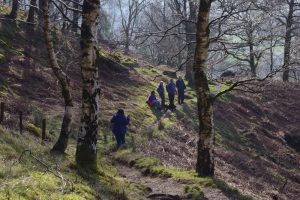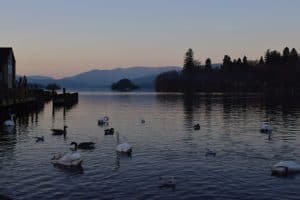“For oft when in my couch I lie, in vacant or in pensive mood/ they flash upon the inward eye that is the bliss of solitude.” – The Daffodils by William Wordsworth.
Has it really been over a month since brook and road, haystacks and fells and limpid lakes were my fellow travellers?
As I lie on my couch rueing the fact that I’m missing an uplifting evening of Swamiji’s talk and my friend Sarab Kapoor’s sublime cooking, I find fresh sustenance in my recent memories of a week in the Lake District with the people I love. This includes not only my beloved travel companions but also the Lake Poets and those country innkeepers whose culinary offerings of hearty English fare, including the most amazing ales and rhubarb scented gins, kept my spirits up!
Has it really been five weeks since I stood upon those craggy heights and surveyed in awe the bucolic landscape of bottle green meadows, distant slate-topped roofs, mighty pikes and blue lakes? It was late February yet it was like a sudden burst of spring. There were snowdrops and crocuses lining the gurgling banks of purling streams and bunches of pubescent daffodils dotting the hillsides. Oh, the daffodils! Little waves of them thrusting their young sunlit faces to the sky as though daring it to bring on the storm clouds so typical of fickle, storm-tossed February. The daffodils won and we spent an unforgettable week soaking in the magic of the fabled Lake District, and roaming as much of the most remote lakes and fells as our unaccustomed, ancient legs could muster, energised by young Simon and Maya, the amazingly athletic Janine and Mike and the very air itself!
I have always loved the Lake Poets and carried with me on this trip a cherished anthology that once belonged to my poet-taster mother-in-law which was gifted to her in the 1950s by her youngest brother Sharad Keskar, a poet, artist and writer himself.
Obviously, Wordsworth’s home Rydal Mount where he lived for most of his life from 1813 until his death in 1850, was our main place of pilgrimage. Our friends Mike and Janine Foale, who are regular visitors to the Lake District, had rented a well-appointed four-bedroom Victorian cottage right in the heart of Ambleside village, close to some awe-inspiring lakes far more voluptuous than genteel, decorous Windermere. Ambleside’s attraction is its proximity to Wordsworth home in Rydal Mount and the cosiness of a real country village with the added convenience of an excellent and inexpensive Thai restaurant and Chinese take-away. Interestingly, there were hardly any Asian tourists during our trip there, unlike Windermere which has become a day-stop for hordes of international tourists on weekends and during summer. Mercifully, it was not summer.
Just a stone’s throw away is the village of Grasmere where another Wordsworth attraction – Dove Cottage – nestles close to the hillside near an inn along a well-trodden main road in this small and utterly charming village. Here is where the legendary poet made his home from 1799 to 1808 with his beloved sister Dorothy who was his literary collaborator. It was also here that Wordsworth wrote the immortal lines “I wandered, lonely as a cloud / That floats on high, o’er vales and hills…” The poem itself was inspired by a visit to nearby Ullswater, itself worth at least a whole day’s visit.
From Ambleside, a 30-minute drive or less takes one to the quaint village of Keswick. Dwarfed by Skiddaw mountain, snowy in winter, and lapped by Derwentwater, Keswick is one of the prettiest towns in Cumbria, and a brilliant base for exploring the upper reaches of the Lake District National Park.
After a hearty country breakfast of bacon, eggs, sausages, grilled tomatoes and hot buttered toast, we set off at a leisurely pace up a winding country road past sheep-studded farms, gurgling brooks, quacking ducks and mile after mile of lush, green meadows with tall hills rising away in the distance. In two hours we were at the foot of Rydal Mount where we were among the handful of tourists – nearly all British as it was term-break time – browsing in the cottage library ready to take our turn in the delightful Georgian dwelling of Wordsworth and his family and which is now a holiday home for his descendants. For an entrance fee of 15 pounds each – the cost of a simple meal – we were left free to wander around the cosy house and grounds and spend a few intimate hours in his study imagining the poet reclining on his armchair and looking out onto his beloved daughter Dora’s fields carpeted with daffodils. Alas, it was too early in the year for us to enjoy the hillside glowing in molten gold but we did get to see promising patches of young daffodils wherever the sun peeped through the trees. Perhaps because his descendants still occupy the house, there is a palpable aura of the revered poet in the sunny living room and his airy study.
The house at Rydal Mount, rented from Lady Le Fleming of Rydal Hall, was a social step up from Dove Cottage, and put him on calling terms with the local gentry. Here he landscaped the garden and wrote The River Duddon, Ecclesiastical Sonnets, the 1820 Miscellaneous Poems, and revised The Prelude, which appeared after his death. In 1843, he succeeded Robert Southey as Poet Laureate. From his inspiring study I descend to the pretty bedroom of his little Dora and am moved by the touching sight of what I presume is a child’s bed only to find out that it was where Dora slept as a young adult and where she passed away at 43. How frail she must have been, as delicate in body as in her sensitivities – not robust enough for the cruel world even her brilliant father could not save her from. But that moment of gloom is soon dispelled the moment I step out onto the sun-dappled garden ringed with banks of snowdrops, lavender, bluebells and daffodils tumbling joyously down the hillside to the edge of tranquil Rydal Water. We walk past a 400-year-old turreted church at the foot of the mount in a reverie before stopping at an inn next door to fortify ourselves with a traditional Sunday meal of roast lamb and Yorkshire pudding for the road back to the village.
Days later, the ghost of Wordsworth kept hovering gently over us as we spent time in London, immersed in Victorian poetry, with Uncle Sharad and Aunt Jane, both long-time members of the Kipling Society of which they were office bearers. Uncle Sharad is one of those rare beings – a dashing former cavalry officer in the Indian army and a sensitive artist rolled into one. He was a cadet in the prestigious Indian Military Academy before becoming a lieutenant of the fabled regiment Hodson’s Horse. Not long after, driven by a different passion, Sharad left for London where he pursued his higher education at Kings College, joined academia and retired as the Head of a school, the first Indian in this role. He is the author of three novels and many articles and books on Kipling and he is an authority on Wordsworth.

I have always loved English literature and the English countryside, and am not ashamed of my attachment to the joys of English poetry and prose despite the shameful history of Britain’s colonisation of India. The Lake Poets cannot be blamed for their nation’s imperialistic machinations. If anything, they helped burnish the sheen of brand Pax Britannica, far more than any lords and ladies of the realm did on the battlefield or in Parliament. The poetry of Wordsworth is not as romantically angst-ridden or sensual as the Romantics, such as Keats and Shelly. He was a man of nature, relying on nothing more for inspiration than the heady beauty of the Lake District’s natural aura and possessing a profound insight into nature’s healing and also frightening power. He saw a compelling need in preserving and respecting nature far before global warming reared its ugly head.

But it was precisely this thought that gave me pause and disturbed me for a while. It made me wonder why spring – even if it was a false one – had arrived so early and stayed on so long, for over a week. Even as I delighted in the little snowdrops whose zeal almost outran their promise, bending their little foreheads as if fearful to offend like an unbidden guest, I saw what it portended. The impending end of innocence. Of nature no longer herself, no longer free to be red in tooth and claw or burgeon wantonly in the foreseeable future. But I was grateful I had been given some intimations of this which heightened my gratitude. I was especially gratified to have had the time – almost three weeks – to spend with my daughter, celebrating her convocation as an MSc graduate from a university and city – Bristol- that has given her so much more than she had hoped for and has brought her so much joy. And for being able to connect with family and people that we know will be our lifelong friends.
There is something deeply satisfying about walking for a week in the countryside, that even a year’s visits to a country’s urban centres cannot match. As one trudges along the same ancient byways that the locals have done for centuries, one feels a kinship with the place, the people and their customs. It is easy to do that in a place as deeply connected to its history as the Lake District with its wild hills, wooded farm groves, ethereal lakes, thinly scattered villages and cosy stone cottages. Unchanged since the days of Wordsworth, the comforting permanence of this beauteous slice of England banishes, even if fleetingly, a traveller’s terror of transience.











